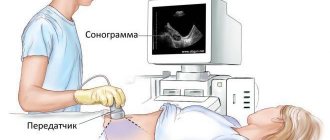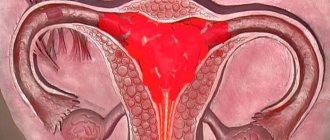Today, there are many hormonal drugs that are used for contraception and the treatment of certain gynecological pathologies. One of the most popular medications in this group is Regulon.
The medicine is prescribed to correct the menstrual cycle, for uterine fibroids or hormonal dysfunctions. However, many women complain that after stopping Regulon there are no periods. This side effect is understandable. To understand why this happens, you must first carefully familiarize yourself with the composition of the drug and the principles of the effect of its active components on the patient’s body.
How long can the delay last?
A delay in menstruation when taking birth control pills can be up to several months.
Its duration depends on the woman’s initial health condition and the type of contraceptive prescribed. If the drug is prescribed for contraception, with high-dose or single-component drugs, addiction to hormones takes up to 2-3 months, low-dose drugs almost do not violate the natural regime. In the treatment of polycystic ovary syndrome, amenorrhea caused by hormonal imbalance, and other disorders, the regulation of cyclic changes and corresponding discharge occurs within 1–2 months.
If the use of contraceptives is completed as planned, after the last pill taken, the next so-called withdrawal bleeding begins 2-3 days later. This is not a sign of restoration of the natural cycle, but its replacement.
Depending on the type of drug used and the condition of the ovaries, real menstruation can occur in a period from 2 weeks to 3 months. During this time, the ovaries and the corresponding functions of the pituitary gland awaken, the maturation of the egg begins and the natural cycle is restored. Changes in the volume of discharge, shortening or lengthening of a previous cycle are not considered pathological: a duration of 21 to 38 days is considered normal, despite the previous duration. As a rule, menstruation becomes more abundant.
If OCs are abruptly discontinued at a young age and there are no endocrine disorders in the body, subsequent hormonal disruption can last for 3–6 months. Reduced thyroid function, insufficient ovarian function, systemic diseases, and age over 40 years are serious risk factors that can lead to amenorrhea.
After using contraceptives for more than 2 years in a row, repeated unjustified switches from one drug to another, or violation of the instructions for use, long-term, up to 1 year, absence of menstruation is likely.
In any case, if there is no menstruation for an unknown or suspected reason, you need to contact an antenatal clinic.
How long does it take for your period to come?
If more than 10 days have passed and your period still does not begin, you should seek help from a doctor. The reason for the delay is not always withdrawal syndrome or pregnancy.
Each woman who takes hormonal contraceptives develops her own “schedule” for the onset of menstruation over several months. For some, they start on the 3rd day after the end of treatment, for others - on the 4-5th. This is all individual and depends on the woman’s body and her hormonal levels.
Let's consider what reasons can cause a delay in menstruation:
- Pregnancy due to non-compliance with the rules for taking oral contraceptives;
- Strict diets, sudden weight loss;
- Severe stress;
- Food poisoning, vomiting immediately after taking Regulon.
So, a delay can occur only when hormonal levels change: due to pregnancy or a disruption in the level and ratio of hormones due to neurological disorders or redistribution of hormones in the body.
Most often, pregnancy occurs due to non-compliance with contraceptives. Even without skipping pills, but only with taking them at different times of the day, hyperovulation can occur, then 1 egg will be released on time, and the other may be released at the end of menstruation without covering with hormones and quietly fertilized.
This can happen if less than 40 minutes have passed from taking the hormone to vomiting. Then the woman does not even mean that she missed taking a contraceptive and needs to additionally protect herself with condoms.
Severe stress can very rarely affect hormonal levels when taking contraceptives, but it is possible. Nervous breakdowns can change the amount of hormones released into the blood.
Sudden weight loss and strict diets cause a redistribution of estrogens in the body, because adipose tissue is a depot of female hormones and their producer. Due to lack of weight and fatty tissue, periods may stop altogether.
Before this, you can do a pregnancy test. If it turns out to be positive, do not worry that taking the pills may somehow harm the baby. Regulon will not affect the development of the fetus.
At an appointment with a gynecologist, the doctor will determine the reason for the absence of menstruation and prescribe treatment. To do this, the following research methods will help him:
- Taking an anamnesis - a detailed question about sexual life, time of taking Regulon, systematicity of taking and daily fluctuations between pills taken. It is necessary to provide information about your sexual partners and the likelihood of infection with various diseases.
- Objective examination - the doctor will conduct an obstetric examination. So he can determine the signs of pregnancy by the consistency, color of the cervix, and the size of its pharynx. Can palpate ovarian cysts, take smears for flora culture, and determine tumor markers.
- Ultrasound of the genitourinary system - will be informative for determining pathological processes of the uterus, ovaries - cancer, polycystic disease, cystoma, uterine fibroids. Also, if there is a possibility of pregnancy, it will help confirm or refute it.
- A blood test to determine hormones - this method will help the doctor determine amenorrhea, determine the goal and course of therapy.
- Additional examinations aimed at identifying extragenital pathology that can cause problems with cyclicity and the appearance of menstruation.
So, there are enough reasons for a delay in menstruation. You need to stop taking Regulon strictly according to the plan, then the likelihood of complications will decrease. And yet, taking the drug will not pass without a trace. After stopping oral contraceptives, prepare for changes in your body, mood, and deterioration in the condition of your skin and hair. But if taken correctly and without deviations, the menstrual cycle will be restored within a few months.
What to do if there is no menstruation after stopping OK?
For 2-3 months after stopping use of the drug, a woman may notice a change in the menstrual cycle - shortening or lengthening it. A cycle duration of up to 36 days is considered normal and does not require any special treatment. In some cases, women may experience a delay in menstruation after stopping birth control pills, sometimes for 2-3 months. In most cases, this is the norm, since this period is required by the body to restore its strength and reproductive function. If menstruation is delayed due to OC discontinuation, the patient should definitely undergo an examination by a gynecologist to rule out pregnancy.
Hair loss after discontinuation of hormonal contraceptives
When discontinuing the pills, patients often notice increased hair loss, up to the formation of bald patches. This is caused by a sharp change in hormonal levels and the body needs time to restore the functioning of all organs and systems. In most cases, after a couple of months the condition of the hair follicles returns to normal, but if hair loss continues 2-3 months after stopping the drug, consultation with specialists is required.
How the body works after stopping the use of OCs
To understand why there are no periods after stopping OCs, you need to understand the principles of hormone production before and after their use. At the end of taking Regulon, the body requires another restructuring. The ovaries and adrenal glands practically do not work during the period of taking the drug, because the body receives the necessary hormones from the outside. The production of hormones is reduced, and the organs need time to restore their function, so you may not have periods for a couple of months.
In addition to the failure of menstruation, drug withdrawal provokes other changes:
- hair loss, deterioration of its structural composition;
- disturbances in the restoration of epidermal cells (dryness, flaking, itching).
Your menstrual cycle can change greatly. Firstly, the volume of blood loss increases, and secondly, the timing changes. If earlier your periods lasted 2–3 days, then after completing the course they can last 5–7 days.
This is the first way the body works. After stopping taking OCs, there is a second option, which is observed in most patients.
With prolonged suppression of the functions of the pituitary gland, the body tries to work in the same mode even after stopping the use of hormones. The pituitary gland, without receiving a reverse reaction, begins to stimulate additional production of follicle-stimulating and luteinizing hormones.
Increased work of the pituitary gland improves the functionality of the ovaries. With such coordinated work of organs, the likelihood of pregnancy increases. OK can cure some types of infertility.
After discontinuation of the drug, hair may begin to fall out
Effect of the drug
Regulon is an oral contraceptive consisting of ethinyl estradiol (estrogen component) progestin, desogestrel. The drug is prescribed for contraception, to treat hormonal imbalance in the body. It is effective in the treatment of PMS and dysfunctional uterine bleeding.
The drug inhibits hormones produced by the pituitary gland, which affect the normal course of menstruation. The production of follicle-stimulating and luteinizing hormones is suspended under the influence of gestagens. As a result, ovulation is suppressed and sperm cannot penetrate the uterine cavity.
If the sperm and egg manage to unite, despite the barriers that have appeared, the fertilized egg simply cannot attach to the uterine cavity, it will not receive the necessary nutrition from the thin endometrium. The effect of Regulon extends to the fallopian tubes. Their contractility decreases, which causes a decrease in the speed of passage of the egg.
The principle of action of regulon is based on the inhibition of pituitary hormones, which are responsible for the normal menstrual cycle. Progestogens inhibit the production of luteinizing hormone and follicle-stimulating hormone. They inhibit ovulation and interfere with the penetration of sperm into the uterine cavity.
Thanks to ethinyl estradiol, the density of cervical mucus increases and its composition changes. At the same time, the environment into which sperm enter becomes more aggressive after sexual intercourse, which prevents them from safely reaching their destination.
A small amount of luteinizing and follicle-stimulating hormones contributes to inhibition of egg maturation, normal development of the corpus luteum, and follicle rupture. The insufficient endometrial layer also grows. If normally the thickness of the layer should be from 1 cm, then while taking the drug it does not exceed 4 mm.
How to take it
To avoid undesirable consequences, you need to start taking the drug correctly. Regulon should be taken from the first day of the cycle, that is, from the first day of menstruation. Then the use of additional contraception will not be necessary.
You need to take the tablet once a day at the same time. This way we will reduce the risk of hyperovulation (the maturation of several eggs against the background of a burst of hubbub). The maximum warm-up time between tablets should not exceed 1 hour.
So, if you are not confident in your punctuality, it is better to set an alarm that will help you maintain a stable hormone level without spikes. If this happens, then you need to take the pill as soon as you remember, if this time does not exceed 24 hours.
If more than the specified time has passed, then it is better to simply continue taking the medicine, leaving the untaken tablets. In this case, additional protection in the form of a barrier contraceptive is necessary.
Before you stop taking it, you need to talk to your doctor about whether it’s okay to stop taking the pills at this time. After all, sometimes Regulon is prescribed for therapeutic purposes, then the duration of administration should be clearly designed.
A break on an unfinished pack of Regulon will definitely lead to bad consequences. The cycle will definitely go wrong, and it will take a long time to recover. This can lead to uterine bleeding.
Avoid taking pills strictly according to the plan.
How to take it correctly
In order not to provoke the development of serious complications and consequences, the drug should be taken correctly.
It is necessary to start drinking Regulon from the first day of menstruation. You don't have to use additional protection methods. If the start of the course was on the 2-5th day of menstruation, the pills must be combined with other methods of contraception for another week.
If menstrual flow has been going on for more than 5 days, taking Regulon is useless; to start the course you need to wait until new menstruation comes.
You need to take 1 tablet per day, preferably at the same time
. This dosage regimen reduces the likelihood that several germ cells will mature at once due to hormonal imbalance. The maximum time difference between taking the drug should not exceed 1 hour. Hormones must enter the body regularly so that there is no sharp drop in their concentration. If Regulon tablets are taken at different times, their contraceptive effect is reduced and additional means of protection must be used.
You need to take the drug for 21 days in a row, then take a 7-day break. This week there will be spotting. Exactly one week later you need to start taking a new pack of the drug, even if your critical days have not yet ended.
Reasons for taking birth control pills
No periods after stopping birth control. Why are these drugs taken by women? Contraception may be prescribed for the following reasons:
- prevention of unwanted pregnancy;
- elimination of painful sensations during menstruation;
- cleansing facial skin from acne;
- stabilization of the menstrual cycle;
- restoration of the female body after an abortion.
The main reason for taking contraceptives is to prevent unwanted conception. To take medications correctly, you should consult a doctor before taking them.
Many women feel a decrease in abdominal pain during menstruation while taking it. Typically, pain occurs due to contraction of the uterus during the cleansing period. Levonorgestrel helps reduce smooth muscle activity, so uterine contractions are less active.
During adolescence, girls develop acne on their facial skin. Usually these problems go away on their own when hormonal levels normalize. But in some cases this does not happen, but increased sebum secretion from the glands and their clogging persist. When taking contraceptives, hormonal levels normalize, and within 3 months the facial skin is completely cleared.
Normally, menstruation should have the same duration. It is no more than 7 days. The cycle is 23-28 days. When its duration is a different number of days, then there is a hormonal imbalance. To normalize this physiological process, experts recommend taking birth control pills for 6 months.
For women with a stable cycle, medications are prescribed after an abortion to normalize hormonal levels.
Influence
Have you discovered that after taking Regulon you don’t have your periods? Don't rush to sound the alarm. The thing is that hormonal drugs have a strong effect on the body, and it needs some time to restore reproductive functions.
Contraceptive pills contain ethinestradiol, desogestrel, and progestin. This medicine not only prevents unwanted conception, but also helps normalize the cycle, relieves the patient from the unpleasant manifestations of PMS and uterine bleeding. Regulon is often used in the treatment of ovarian dysfunction, to normalize the production of sex hormones in the patient’s body.
The pituitary gland of the fair sex produces special hormones that are responsible for the menstrual cycle, reproductive functions and the onset of menstruation. The contraceptive drug contains active components that inhibit the production of follicle-stimulating hormones. At the same time, the patient’s ovulation process is significantly inhibited, and sperm after intimacy cannot penetrate the uterine cavity.
Under the influence of Regulon, the process of contraction of the fallopian tubes slows down, and the speed of movement of the egg is minimized. The mucus in the cervix becomes very dense, its composition changes. A kind of plug is formed that prevents sperm from reaching the egg.
In patients who regularly take hormonal contraceptives, too little endometrial tissue is formed. If in an ordinary woman the thickness of such a layer in the uterus is 10 mm, then in a patient taking Regulon it is only 4 mm. Even if the sperm manages to penetrate the egg, the fertilized embryo will not be able to attach to the walls of the uterus.
Delayed menstruation after stopping the pills
A normal occurrence is a delay in menstruation when you stop taking contraceptives. When a delay occurs for several days after taking contraceptives, then the body begins to feel a lack of artificial hormones. In such a situation, he has to remember the mechanism for independently producing them. This process can take a long time - the ovaries are used to being in an inhibited state.
Lack of menstruation after Yarin
Long-term use of the combined drug Yarina causes ovarian hyperinhibition syndrome. In this condition, the woman’s gonadotropic function of the pituitary gland is blocked. This phenomenon is reversible and after a period of time, periods will appear again.
Delay after Qlaira
The composition of Klayra is significantly close to the natural hormones of the human body. After taking the drug, side effects occur in very rare cases. If after cancellation there is a delay in menstruation, then the woman should be patient. After taking contraceptives, the delay will pass by the next menstrual cycle, and spotting will appear according to the timing. But they may be more abundant than usual. There is no need to be alarmed; in 2–3 months the situation will stabilize.
No periods after stopping Jess
This monophasic contraceptive includes categories of tablets with two different actions. The first (pink) contains hormones to prevent unplanned pregnancy, the second is a pacifier. Jess's intake is designed according to a specific pattern that cannot be violated. If after discontinuation of the drug there is a delay in menstruation, then you can safely go to the gynecologist to confirm pregnancy. The fact is that missing even one real pill can lead to conception.
After Lindinet
The drug dosage regimen involves a seven-day break in each menstrual cycle. In theory, the usual discharge should begin at this time, but there is a delay in menstruation. This can happen when you miss a dose in combination with unprotected sex. After discontinuation of Lindinet, a delay in menstruation means pregnancy.
What to do if there is a delay
If, after stopping the drug, menstruation still does not come, the first thing to do is take a pregnancy test. If it is positive, then there is no need to worry about the effect of the drug on the fetus, since Regulon cannot harm the embryo in any way.
If the test is negative, you need to go to the doctor; during the visit, a number of studies can be performed to determine the cause of the delay.
- Anamnesis collection. The patient is asked in detail about her intimate life, the frequency of taking the drug and daily fluctuations between taking pills. A woman should talk about her sexual partners and the likelihood of infection with various pathologies.
- Gynecological examination. During the examination, the doctor can determine pregnancy by the color of the cervix and its density, and by the size of the pharynx. Using two-handed palpation, cysts in the ovaries can be identified. During the examination, smears are taken for microflora and cytology.
- Ultrasound of the pelvic organs. The study confirms the presence of pregnancy, helps to identify cancerous tumors, cystomas, fibroids, polycystic ovaries, and other formations in the reproductive organs.
- Hormone analysis will help determine the presence of amenorrhea and develop a treatment regimen.
- To determine extragenital diseases, other types of examinations may be prescribed to determine the cause of menstrual irregularities.
There is no need to be afraid of menstrual irregularities after stopping Regulon; if you properly avoid taking the drug, your cyclicity will be restored within a few months.
anonymously
Hello! I am 21 years old. In April 2012, I was admitted to the hospital with a mild form of anemia, I was not operated on, and was treated conservatively. After that, the doctor prescribed Regulon for six months. Instead of six months, I took it for 9 months, but all this time I consistently had intestinal spasms in the mornings. Every morning for about two minutes, quite strong and bloating. Sometimes every other day, a couple of times there were week-long “breaks”. At the same time, I didn’t know before that I needed to take it strictly by the hour and just drank it in the evenings, and when I found out, I started drinking it every day at exactly 10 pm. This was the last 2-3 months of taking Regulon. As soon as I started drinking them exactly by the hour, a week or a week and a half before my period, I started having some strange discharge. It was clearly not bloody, and you couldn’t even call it spotting - it looked a lot like thrush, but it seemed to be reddish-brownish in color, sometimes pale pink. This lasted for several days - literally a drop a day, then it stopped, and after a week or two, during a seven-day break, normal periods came. Later, I heard not very good reviews about Regulon and stopped drinking it (by that time I had already finished the pack). I went to the gynecologist, she prescribed Yarina or Logest, they have good reviews, and they cost 2 times more than Regulon. She also prescribed drops and suppositories for thrush, although I forgot to ask about the discharge. But the problem is that I already have a long delay, so I can’t start drinking them. I finished the last pack of Regulon on the twentieth of December, then my period started at the end of December around the 27th-29th, and now a month has passed, and new ones still haven’t arrived. I haven’t had such a huge delay yet. By the way, the discharge that I wrote about above (like colored thrush) just recently stayed for several days, as usual. I also thought that my period will come soon, but it’s still not there. 2 questions - could the delay be related to the cancellation of Regulon or am I pregnant? (protected with PPA, sex not very often). - what could this strange discharge that has been bothering me for several months be? Thank you
Good afternoon. What is the cause of anemia - bleeding? There may be a chronic inflammatory process that also causes menstrual irregularities. This is a COC containing 30 mg of ethinyl estradiol, by the way, like Yarina. But Logest contains 20 mg of estrogens, and is more suitable for your age. When taking COCs, it is enough to approximately stick to one time, this is not important. You need to be examined for sex hormones and urogenital infections, as well as (endometrial condition). Also examine the thyroid gland and donate blood for sugar. The doctor will prescribe appropriate treatment for you.
anonymously
Yes, my follicle burst and there was bleeding inside. Can the discharge that I have be indicating the presence of a chronic inflammatory process? I’ve never had any other cycle disorders; by the way, my period came right on the day I wrote to you. I read on the Internet that this happens to many people after stopping COCs... After the regulon, the stomach stopped hurting, the bloating went away. I wanted to choose Yarina, she seems to be like a beauty contraception, at least the instructions say that it is prescribed for acne, some write that my breasts are fuller, but I am now losing weight, and my breasts have lost a little weight ((( but since you recommend Logest for me, I’ll choose it.
When taking Regulon tablets, a woman’s hormonal system gets used to the fact that the adrenal glands and ovaries do not need to strain and work on producing hormones, since they come from outside. When you stop taking Regulon tablets, serious changes begin to occur in a woman’s body. The body needs some time to rebuild itself again and this can take several months.
The cycle can change greatly and it may be normal to have no periods after stopping Regulon. This situation is observed in a significant proportion of women after stopping taking contraceptives, and they talk about withdrawal syndrome. Another development of events is possible in the form of a change in the nature of menstruation. If when taking the drug it was observed regularly and lasted for 2-3 days, then after eliminating it it can last up to 7 days. It is impossible to predict what day your period will arrive and the nature of the discharge.
After stopping taking Regulon tablets, a woman often experiences not only disruptions in her previously established menstrual cycle. As a rule, the condition of the hair worsens, it becomes more brittle and there is a problem of hair loss. The skin becomes dry, it may itch and peel. Women often begin to complain of mood swings, they experience increased sweating, and their mammary glands may swell.
Possible complications when taking the drug
After getting used to it, your period comes on the 22nd day of the cycle. But even with the normalization of the body’s activity, unwanted problems may appear. The following pathologies may occur:
- cessation of ovarian function;
- breakthrough bleeding;
- hormonal imbalance;
- change in the quality of vascular fiber;
- dyspeptic symptoms;
- allergic reactions to active substances;
- change in the thickness of blood fluid;
- onset of pregnancy.
Uncontrolled use of drugs can cause complications
Ovarian failure is diagnosed only after stopping birth control. With this pathology, the absence of ovulation is detected for several cycles. During diagnosis, the doctor discovers the presence of multiple small follicles on the surface of the ovary. In this case, no dominant neoplasm is detected. With such ovaries, pregnancy is impossible. This pathology has been found in many women in recent years. In most cases, organ activity normalizes on its own. If the problem does not disappear, it is necessary to undergo complex hormonal treatment.
Some patients are faced with the fact that menstruation began while taking birth control pills. The volume of discharge gradually increases. They contain no mucus impurities. The color of your period becomes bright red. Such discharge indicates breakthrough bleeding. Pathology is detected in 20% of patients. The problem is associated with disruption of hormones and blood vessels. A sharp surge in progesterone causes endometrial rejection. The walls of the uterus are damaged. Blood begins to leak from damaged vessels. In case of such a complication, it is necessary to call an ambulance. Only specialists can competently stop blood loss.
Often, after stopping contraception, women complain of irregularities in their menstrual cycle. In the first few months, your own cycle is restored. If changes in the duration of menstruation persist, it is necessary to undergo a medical examination. A woman needs to donate blood three times during her cycle. The liquid is tested for the content and amount of a certain hormone. The reason for the surges is a malfunction of a hormone. After the examination, the doctor prescribes additional drug treatment.
Problems also arise with the vascular fiber. A change in the volume of menstruation also occurs when the walls of blood vessels are damaged. Contraceptives cause changes in the elasticity of blood vessels. The fiber becomes less flexible and dense. Against this background, a change in the general condition of the vascular tissue occurs. With long-term use of birth control pills, women may develop varicose veins. The disease is characterized by the formation of cavities on the vascular fiber. The fluid stagnates in them and leads to the formation of large venous nodes. This pathology can affect any organ.
Additional factors
Some patients complain of the appearance of dyspeptic symptoms during menstruation when taking oral contraceptives. Nausea, vomiting or diarrhea may occur during treatment. Normally, such complications should disappear within three months. If they persist, you need to contact your gynecologist to change the drug.
Some pills lead to an increase in allergic reaction
Like many medications, birth control pills can cause a variety of allergic reactions. Exacerbation of allergies often occurs during menstruation. To get rid of the problem, you also need to visit a medical center.
Oral contraceptive medications do not always cause thinning of menstrual flow. In some cases, periods become thick and scanty. This pathology develops due to an increase in the level of platelets and leukocytes. The growth of platelets is accompanied by the formation of neoplasms in the vascular lumen. Women taking oral contraceptives often suffer from thrombophlebitis.
The annotation attached to the drug clearly states the rules of administration. Birth control pills must be taken at exactly the same time every day. If a woman forgets to take the medicine, she must take the pill at any time. At the same time, the instructions state that it is necessary to adopt additional protection methods. If a woman does not take it, she needs to closely monitor the onset of her next period. If there is a slight delay, it is recommended to do a test for the presence of human chorionic gonadotropin. A common consequence of this disorder is pregnancy.
How to quit
It is important to follow the rules for using the drug and stop taking it correctly so as not to provoke unpleasant reactions from the body. You need to consult a gynecologist and, based on his recommendation, choose the best time to quit Regulon. You need to think especially carefully about throwing pills if they are prescribed to obtain a therapeutic effect. The treatment regimen provides for a certain duration of taking the drug. By violating it, you can harm the therapy and not get rid of the problem.
It is forbidden to stop taking Regulon halfway through the pack; you need to finish the pack and not buy a new one. Otherwise, irregularities in the menstrual cycle may occur, which will need to be restored over a fairly long period. This is fraught with uterine bleeding.
You need to stop taking Regulon according to a clear plan developed by your doctor. It takes into account the individual characteristics of the body, the purpose of prescribing the drug and the duration of use.
Selection rules OK
The selection of the drug should be carried out exclusively by a gynecologist. The same oral contraceptive method may not suit all women.
To make a decision, the doctor takes into account the constitutional type:
- Estrogenic. Women are short, with well-developed mammary glands. Their menstruation is heavy and long. In this case, it is recommended to take birth control pills Rinevidon, Triquilar, Logest.
- Progesterone. A distinctive feature of representatives of this type is their tall stature and masculine appearance. They are characterized by oily skin, small mammary glands and scanty, short menstruation. The best option is the use of drugs Yarina, Diane-35, Jess.
- Mixed. Women of this type combine the characteristics of the other two. Most often they are prescribed Mercilon, Novinet, Regulon.
Each type has a specific group of medications. If selected incorrectly, the drug may not have the desired effect or cause unwanted complications. In addition, the choice is influenced by the results of blood tests, ultrasound of the gallbladder and liver.
How to induce menstruation with Duphaston? How to drink Duphaston to induce menstruation
The female body undergoes regular cyclic changes. So, in the first weeks after menstruation, the hormone estrogen is produced. Thanks to this substance, the follicle grows, which later releases the egg. In the second half of the cycle, progesterone predominates. It affects the contractility of the uterus and prepares the body for the next menstruation (in the absence of pregnancy). If conception has occurred, then this substance supports the development of the embryo, removing the tone from the reproductive organ.
Often the fairer sex faces a delay. However, the reasons for this phenomenon are unknown. In this case, it is worth visiting a doctor and getting a prescription for correction. Doctors usually try to induce menstruation with Duphaston. It is this method that will be discussed further. You will learn a lot about Duphaston (how to take it to induce menstruation, and whether there are any contraindications). You will also be able to get acquainted with the nuances of this treatment.
Hormonal background and progesterone
The hormone progesterone is normally produced by the pituitary gland and adrenal glands. However, malfunctions often occur in the female body. This pathology must be treated. Otherwise, hormonal imbalance can negatively affect the health of the reproductive system.
Most often, a delay in the next menstruation can be caused by stressful situations, poor diet, non-compliance with the regime, hormonal diseases, neglect of taking certain medications and pregnancy. In all cases, the use of the drug should be different.
Can Duphaston cause menstruation?
This drug contains the main active ingredient called dydrogesterone. It is a synthetic analogue of progesterone, which is secreted by the ovary
Source
Menstrual irregularities when using the drug
Each has its own monthly cycle and it does not change with the start of the use of an oral contraceptive (OC). During a course of taking hormonal medications, each woman’s body will react individually, so menstruation may not come immediately after taking 21 tablets. In the first 3 months of taking the drug, cycle disturbances may occur while the body adapts and begins to function normally in the required mode. If after taking Regulon there are no periods for 10 days from the end of the pack, you should consult a doctor.
The reasons for such a deviation from the norm can be varied.
- Pregnancy.
- Violation of diet, severe weight loss.
- Stress.
- Intoxication. Vomiting or diarrhea after a woman takes the pill.
A delay will occur when hormonal levels change, due to pregnancy, or when hormones are redistributed during stress. Fertilization often occurs when Regulon is taken incorrectly. Even if the pills were not missed, taking them at different times with an hourly interval can trigger the appearance of hyperovulation. In this case, one of the eggs reaches its destination on time, and the second is released at the end of menstruation without the protection of a hormonal agent and is quickly fertilized.
The most unpredictable factor is intoxication. If the rules of use are followed, vomiting and diarrhea (if the pancreas is malfunctioning) do not allow hormones to spread into the plasma. This happens when 40 minutes have passed from taking the pill to vomiting or with severe diarrhea lasting more than a day.
Severe stress provokes the release of hormones into the blood, disrupting the cyclicity and already familiar rhythm of the body. Sharp weight loss and extreme diets can cause a lack of menstruation. Adipose tissue produces female hormones estrogens. Women who are too underweight very often go to doctors with complaints that they do not have periods. Fertilization also does not occur with insufficient weight; the body is not able to provide the embryo with the required amount of nutrients necessary for its full development.
Final part
If you do not have your period after completing the course or while taking OK, you should definitely consult a doctor and undergo a full examination. First of all, an obstetric examination of the cervix is carried out, which allows you to determine the size of the ovaries and possible pathological formations on them.
Then an ultrasound and blood test are prescribed to show hormone levels. An additional examination may be prescribed to determine extragenital pathologies. If you don't have your period, you don't need to self-medicate. Sometimes additional vitamins and treatment are needed to recover after taking OCs.
Signs of pathological menstruation
Minor bleeding begins a few days after stopping taking the OC and lasts about seven, maximum fourteen days. Such changes in the body are called withdrawal syndrome.
The reason for a visit to the gynecologist should be heavy discharge during this period, accompanied by pronounced pain and weakness.
Scanty or excessively heavy discharge during the period of stabilization of the cycle is considered normal, but if after several months the situation does not change, you need to be examined by a gynecologist. Such abnormalities may indicate serious health problems.
Delayed menstruation
The absence of menstruation after stopping OC is considered normal. The duration of the recovery process can be up to three months. If the cycle does not stabilize after six months, you need to conduct a full examination and identify the problem.
In many ways, the timing at which menstruation should begin depends on factors such as:
- type of oral contraceptives and duration of their use;
- age;
- body condition and history of gynecological diseases.
The cycle is restored faster in young girls, but in women approaching menopause, it may not stabilize at all. In case of suppressed immunity, it will take about six months to normalize the functions of the ovaries.
Very heavy periods
After one, and sometimes two months, the first menstruation appears after OK. Due to the fact that while taking the drug, the discharge was scanty, during this period it can become abundant. This is due to hormonal imbalance.
Excessively heavy periods can lead to anemia, as the amount of blood lost increases significantly. In this case, there is a deterioration in the general condition, weakness and dizziness. During this period, it is recommended to start taking medications that contain iron.
In cases where the appearance of heavy bleeding was preceded by a delay, there is no cause for concern. In a short time the cycle stabilizes. You should consult a gynecologist only when such menstruation bothers you for a long time. There is a risk of bleeding.
Scanty and short periods
In most cases, after completing the use of OK, the cycle becomes stable. Violations are observed only in those women who have previously had irregular, scanty menstrual flow.
In addition, the cause of scanty discharge may be:
- pregnancy;
- prolonged absence of menstruation;
- genitourinary system infections;
- polycystic disease;
- cancerous formations.
To exclude the development of pathologies, it is recommended to undergo examination by a gynecologist.
Period more than 7 days
The first period after birth control often lasts more than a week. This process should not cause concern in women and is considered normal, but only if the discharge is scanty and not accompanied by severe pain.
If you find clots in your menstrual blood or your general condition worsens, you should go to a gynecologist to prevent bleeding.
Lack of menstrual flow
The main reason that there are no periods after stopping Regulon is pregnancy. The reproductive system begins to work with redoubled force, increasing the chances of conception. If there is a delay in menstruation, and the test is negative, the doctor may consider other reasons for this phenomenon.
- Amenorrhea, menopause. It can occur against the background of improper functioning of the endocrine system, both in women on the threshold of menopause and in patients of childbearing age.
- Myoma, polycystic ovary syndrome.
- Oncology.
- infections of the genitourinary system.
If a week has passed since taking the last Regulon tablet and your period does not start, you need to consult a doctor; self-medication is prohibited.
Reasons for lack of menstruation
What reasons can lead to the fact that you do not have periods when you take birth control pills? This is not only pregnancy, because menstruation is a complex mechanism, and outside interference always negatively affects the regularity of the cycle.
Video: why there are no periods when we protect ourselves with OK.
Tablet type
Some birth control pills can stop your periods or make them irregular. Other types, sometimes called seasonal pills, may only cause a woman to have four periods a year.
Some women experience lighter bleeding, while others may be able to say goodbye to their periods entirely. This abnormal error is called amenorrhea.
Cycle failure
Most menstrual cycle disruptions occur after a violation of the OK regimen, if you missed two or more doses of pills in a row. Most of the tablets work in 4-week cycles. A woman taking OCs should menstruate approximately every 28 days. Depending on the type of birth control pill, some women may get their period more often than usual. And it happens that after using contraceptives, menstruation may stop altogether.
Stress
Excessive stress affects the mind and body. Too much stress disrupts the functions of the hypothalamus. This is the part of the brain that controls hormonal regulation. Finding the source of your stress will help your periods return.
Nutrition
Changing your eating habits or losing weight too quickly can cause you to miss your period while using birth control. Low body weight, 10 percent less than normal, will also prevent your body from ovulating and maintaining regular cycles. Women with eating disorders such as anorexia and bulimia are especially at risk.
Load
Excessive physical activity associated with taking contraceptives disrupts hormone levels, depriving you of your period. Of course, exercising in moderation is a great way to stay healthy and fit. The cause is usually more strenuous training, similar to what professional athletes do.
Delay your period with Regulon
Good afternoon. I would like to consult you about the regulation. I'm going to go south, but, as luck would have it, my period is about to start in the middle of my vacation. Can I delay its onset using Regulon for at least 7 days? If yes, then how to do it correctly (when to start and how long to drink). 28 years old, no children, but when I was being treated for infertility, I was prescribed this particular drug (almost 2 years ago). The cycle is regular 28 days. Thanks in advance for your answer.
Related and recommended questions
67 replies
Hello! If you want to delay the onset of menstruation, you need to continue taking the drug immediately after finishing the previous package, without interruption. Take tablets from a new package for as many days as needed (maximum until the package runs out).
If it is the first time, then disruptions in the cycle are possible, menstruation may come earlier, and on vacation - in the first cycles the body gets used to OK - I thought you’ve been taking the drug for a long time - then it’s easier. Try it. Take 2 cycles and stop if desired
Please answer, that is, you can delay taking 2 tablets after 21, wait until the prescribed 8th day and start drinking a new blister? Thank you in advance for your answer.
And good afternoon to you too! You didn't even say hello. I wonder why? After all, even when people on the street ask for directions, they say hello, but you don’t even consider it necessary, although, in fact, you are seeking a consultation with a DOCTOR. I don’t understand this attitude, honestly. P.S. By the way, did you understand what you asked? Because I don't have you
I apologize to you, I usually always say hello to everyone, but apparently I’m very worried that I missed this moment, please accept my apologies. My question is the following, yesterday I finished 21 tablets of Regulon, and I really need to delay my periods
Source
Changes after discontinuation of Regulon
When a woman takes Regulon, the required dose of hormones enters the body from the outside, so the ovaries and adrenal glands gradually stop producing hormones on their own. As soon as the drug is discontinued, the woman’s body again begins to get used to the new hormonal status. This provokes a delay in menstruation or a change in the menstrual cycle.
Lack of hormones leads to deterioration of the hair, nails and skin, and rashes may appear. Your periods may become heavier and longer.
After discontinuation of the drug, the pituitary gland, whose activity was previously suppressed, first begins to work normally, and then redoubles its efforts. A double dose of sex hormones can be sent to the ovary, which also affects their work. In this case, the likelihood of getting pregnant increases significantly. This feature of oral contraceptives is often used in the treatment of infertility.
Questions
Question: How to induce menstruation if you are late?
A delay in menstruation is an unpleasant event in a woman’s life. In most cases, women associate a missed period with an unplanned pregnancy. However, there are situations when pregnancy is excluded, and there is simply a delay in menstruation. When a menstrual cycle fails, any woman strives to return everything to normal as quickly as possible. For this, women are looking for a recipe on how to induce menstruation?
If a woman wants to induce menstruation during a short period of pregnancy, it is not recommended to do this at home. The fact is that in this case the woman will be faced with an abortion, which was performed from time immemorial in the villages by grandmother-healers. Nowadays, many are fascinated by the flair of “natural” herbal medicine, which, in their deep conviction, is effective and safe, in contrast to the methods of doctors trained in medical institutes. However, the statement about the unconditional superiority of folk methods over traditional ones is simply a desire to romanticize everything old and find some ideal that is, in principle, achievable. You should not succumb to such a mood when deciding on terminating an unwanted pregnancy at an early stage. It is better to turn to facts and figures: for example, traditional methods with relatively high safety are low in effectiveness, that is, they lead to the desired result in only half of women. And highly effective methods are dangerous because their side effect is bleeding, which is fatal because it is very difficult to stop. According to researchers, the mortality rate of women who used traditional methods for early abortions reached 35–40%. Moreover, the cause of death in the vast majority of cases was bleeding. Medical abortion is also fraught with complications, but mortality after
Features of the use and withdrawal of contraception
There are several rules for using the drug and correctly stopping its use: It is undesirable to take pills for a long period and skip a dose. If a woman intends to conceive and carry a child in the future, after several months of treatment with Regulon, it is necessary to take regular breaks. This way, the reproductive function of the body will have time to recover.
Before stopping the medicine, you should consult a gynecologist. It is safest to stop using the product with the last capsule from the package. The risk of negative consequences will be minimized, and a situation where there are no periods after Regulon is discontinued will not occur.
The effect of the tablets remains for 7 days after finishing taking it. Then, to avoid pregnancy, you need to switch to barrier contraception. If a woman wants to conceive a child, it is better to wait until the third menstruation after the end of the course. During this time, the reproductive organs should resume functioning. Also, before conceiving, be sure to undergo a full body check in the clinic.
There are situations in which the medication has to be stopped urgently. Immediate cessation of use of the drug occurs in case of sudden surges in pressure (arterial pressure reaches 140/90), spasms in the legs, and breathing problems.
Side effects that may occur while using an oral contraceptive include jaundice, skin rash, nausea, gastrointestinal pathologies, constant lethargy and fatigue, itching for no reason and liver problems. Such situations require immediately stopping the medication and contacting a doctor.
You can not wait until 21 days of therapy and stop taking it if serious injuries and burns have occurred, surgery is planned, or there is an urgent need to use inductive drugs for kidney oxidation, medications for seizures, tranquilizers and antidepressants.
In what cases is Duphaston appropriate?
Duphaston is prescribed for a disease such as amenorrhea - irregular menstruation caused by disturbances in the functioning of the ovaries. When the body’s response to the drug is correct, then in the middle of the cycle the egg should be released from the follicle, which means ovulation should occur. Gradually, the remaining follicle will form a corpus luteum, which produces progesterone.
Progesterone itself is responsible for the formation and thickening of the endometrium, which leads to the favorable implantation of a fertilized egg if there is room for conception. In addition, progesterone helps prevent spontaneous abortion.
Duphaston is prescribed for the following problems:
- The growth of the endometrium outside the uterus is endometriosis;
- Infertility due to luteal insufficiency;
- Threat of spontaneous abortion;
- Habitual miscarriage caused by a deficiency of progesterone in the body;
- PMS;
- Irregular menstrual cycle;
- Secondary amenorrhea (complex treatment with estrogen);
- Uterine bleeding.
The action of Duphaston is aimed at the endometrium. Under its influence, the mucous membrane of the uterus thickens. During critical days, the enlarged endometrium is rejected. In this simple way, Duphaston tablets promote the onset of menstruation. There are situations when the drug causes rapid growth of the wall, which can lead to heavy spotting and even bleeding.
Indications and contraindications for use
The main indications for the use of the drug include contraception. In some cases, Qlaira is effectively used as a normalizer of the menstrual cycle or in the treatment of other gynecological pathologies. The latter, for example, includes endometriosis. But it should be said that this area is not the main one for the use of the drug.
With the correct regimen of using the drug at an early stage of menopause, it becomes possible to prevent many negative effects. This allows you to make this period calmer and more comfortable for the woman. Since the drug contains hormonal substances, its effect affects almost all body systems.
This leads to a very wide range of contraindications for the use of the product. You should not use the medication if there are any contraindications, as this can cause serious negative consequences. The conditions listed below are absolute contraindications to the use of contraceptives:
- a history of thrombosis that occurred in the venous or arterial network;
- thromboembolism of various types (for example, pulmonary artery);
- conditions that can be regarded as harbingers of thrombotic changes (for example, ischemia of various types, varicose veins);
- the presence of risk factors for the formation of thrombosis (arterial or venous). This includes, for example, hypertension, prolonged limb immobility, pathological changes in the heart valves;
- migraine;
- focal neurology;
- the presence of diabetes mellitus, aggravated by vascular damage;
- pancreatitis accompanying a significant concentration of triglycerides in the bloodstream;
- severe liver pathologies. In this case, the contraceptive is recommended to be used after the liver function returns to normal;
- liver failure;
- oncological changes in the liver;
- hormone-dependent oncology (for example, breast or genital cancer);
- the presence of factors that allow one to suspect the development of oncological processes with hormonal dependence in the body. In this case, the use of the medication should be postponed until the health situation is completely clarified;
- bleeding inside the vagina of unknown etiology;
- the period of pregnancy, as well as conditions in which there is a suspicion of pregnancy. Here it is also recommended to postpone the use of the product;
- the presence of individual intolerance or allergic reaction to the components of Qlaira.
These contraindications are absolute. If one or more of these conditions develops while taking the drug, you should stop using it immediately.
But the contraceptive also has relative contraindications. If the patient has such conditions, then using the drug is not prohibited. But the appointment is possible under the supervision of a doctor, who must carefully monitor the dynamics of the woman’s health.
When deciding on the advisability of a course of Qlaira, you should weigh both its benefits and possible risks. The potential risk when using a contraceptive with relative contraindications depends on the individual characteristics of the body of a particular woman. Relative contraindications include:
- factors contributing to the development of thrombotic and thromboembolic changes in the body (excess weight, smoking, migraine, hypertension);
- disturbances in the functioning of the heart valves;
- long period of immobility;
- surgical intervention. It is usually recommended to stop taking hormonal contraceptives several weeks before surgery. In this case, specific instructions are given by the attending physician;
- traumatic effects;
- disorders in the peripheral circulation caused by diabetes mellitus, ulcerative colitis, Crohn's disease and certain types of anemia);
- angioedema;
- all types of pathologies that appear or worsen while taking hormonal drugs (cholelithiasis, porphyria, otosclerosis, chorea, etc.);
- postpartum period.










